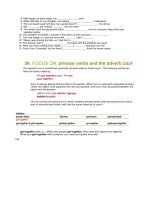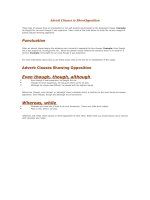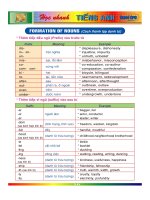UEfAP adjective adverb
Bạn đang xem bản rút gọn của tài liệu. Xem và tải ngay bản đầy đủ của tài liệu tại đây (91.24 KB, 1 trang )
25/2/2016
UEfAP Adjective/Adverb
UEfAP Adjective/Adverb
Introduction
Although adjectives and adverbs are quite complicated, there are some simple differences which are
often confused. These mistakes can simply be avoided by proofreading.
Adjectives have many uses but one main use is as a modifer in a noun phrase. For example, a rich
man, or a difficult exam. There are different categories of adverb with different functions but one
main category is the degree adverb and typically it modifies an adjective (extremely difficult) or a verb
phrase (he walks quickly).
Adjectives and adverbs often come in pairs (quick/quickly, easy/easily, strange/strangely,
direct/directly) and these are often confused.
Read the following text and observe the adjectives and adverbs:
Peasant populations are often highly conservative and are suspicious of those outside their small circle
of neighbours and kinfolk. Wellintentioned government health officers, peace corps volunteers, and
development technicians are frequently unable to secure the confidence of the peasant communities
that they wish to help. Technical assistance specialists conclude, therefore, that the prime obstacle to
development is the peasants' irrational aversion to novelty. In most cases, however, this conclusion
depends upon wrenching the peasants' conservative values and attitudes out of the colonial and
postcolonial context in which such attitudes and values are realistic and perfectly rational.
(Marvin Harris, Culture, people, nature.
/>
1/1









